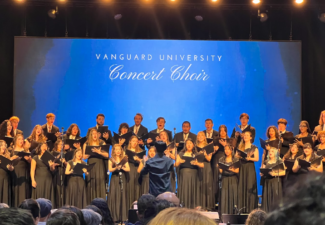From informative essays, to dramatic poetry, to hard-hitting newspaper articles, English majors write in a variety of ways, entrancing readers with their words. They study literature influenced by culture, politics, time periods, and authors’ personal lives, to better understand the world and themselves. English is a versatile subject that can be studied to go into a multitude of careers including teaching, law, journalism, copywriting, administration, and so much more. So, the question is, why are there so few English majors?
At Vanguard University specifically, the English department has always been relatively small.
Warren Doody, professor of English, Chair of the English Department, and Associate Dean of the Division of Education, Arts and Humanities, shares how many English Majors there have been over the years.
“This year’s number of English majors is 39, which isn’t bad compared to other years. Here is the breakdown over the last several years:”
2021-22: 39
2020-21: 37
2019-20: 43
2018-19: 44
2017-18: 42
2016-17: 36
2015-16: 30
2014-15: 24
He suggests that this may be the norm for a college of Vanguard’s size, with numbers always staying in the mid-30s and mid-40s for the most part.
However, it’s still seen nation-wide how the number of Humanities majors overall is on the decline. As to why this is occurring overall, and specifically to the department of English, several English majors at Vanguard have suggested reasons.
Michael Robles, Junior English major with a creative writing emphasis, is a part of the teaching ITEP program at Vanguard University. Robles gives several possible theories for the scarcity in English majors. He suggests that one reason may be students’ distaste for essay-writing.
“I feel like essay-writing is definitely one of the least-liked assignments for high school and college students, so to go into a major where that is a focal point on what you do, doesn’t interest many people.”
Robles also comments on the emphasis there is placed on jobs in STEM, which brings attention away from the humanities department as a whole. He states that it comes down to those two things. Students’ interest in reading and writing, and students’ desire for a career in the English field.
Jared Rhone, Sophomore English major with an emphasis in journalism, hopes to go into the field of sports journalism once he graduates from Vanguard. He began as a Communications major initially, but switched to English because his main goal was to improve and diversify his writing abilities.
Rhone explains the scarcity in English majors from a few different viewpoints, the first
being that Communications majors are very similar to English ones. He suggests that more students do go into an English-related field, just not as English majors. In regards to these students, Rhone says:
“Even though they may have similar skill sets, interests, general motivations, Comm seems to get the majority of the people.”
Rhone also postulates that literature can be a daunting subject to study. He theorizes that:
“Another reason there are so few English majors is because they are intimidated and/or deterred when they see classes about literature from hundreds of years ago or classical eras. Because of this, I feel there are people who take English as a minor instead so they can avoid the bulk of those classes.”
Rebekah Pinedo, Sophomore English Major, hopes to be an English teacher one day and also possibly to work in administration. Like Rhone, she emphasizes how the large amount of reading and writing that comes with being an English major can be daunting.
She also adds that “people tend to underestimate their writing and reading skills. There may also be the misconception that being an English major strictly consists of writing long, research papers. This is not the case. Being an English major fosters the freedom to write creatively while also strengthening research and literary skills.”
Professor Doody gives his insight into the reasons behind it as well.
“Regarding the lack of English majors at Vanguard and in general, I think part of it is due to a society that reads less, which makes a major that requires a heavy reading and writing load less attractive.”
He also states that there is a ‘myth’ that English majors don’t have many career opportunities. He corrects this idea, saying:
“In fact, it is not hyperbole to say that an English major, one designed to develop writing, as well as critical reading and writing skills, can be beneficial to most lines of work.”
So, the declining number of English majors, and Humanities majors as a whole, seems to have many contributing factors behind it. It may be partially due to student’s perception of the major, partially due to society’s devaluation of reading, and partially due to an emphasis on other career paths. Whatever it may be, this department seems to remain small.
This smallness has its benefits. English majors at Vanguard have expressed their fondness of the smallness because of the personal nature of the classes and how close relationships with professors can be established. Students also appreciate the major as a whole, because of the ability to express themselves in a tight-knit group.
Robles explains:
“You become vulnerable. Sometimes, you end up putting your heart onto paper, and you feel connected to your work on a whole other level. It’s happened multiple times with me. The English major definitely makes you more connected with your fellow peers because of this, and it shapes you a lot. I’ve grown a lot since I started at Vanguard, and I don’t think I’d be the person I am now if I didn’t decide to go into English.”
While society may need more writers and teachers as a whole, English students can enjoy the benefits of getting their writing closely looked at and discussed in class on a personal level most majors cannot.

 The Liturgical Calendar: Should Christians Observe It?
The Liturgical Calendar: Should Christians Observe It? Embracing Authenticity in the Pursuit of Success: A Reflection on Journalism, Education, and Meaningful Academia
Embracing Authenticity in the Pursuit of Success: A Reflection on Journalism, Education, and Meaningful Academia Spring Concert: Music From Around the World
Spring Concert: Music From Around the World Recycling on College Campuses
Recycling on College Campuses
Leave a Reply